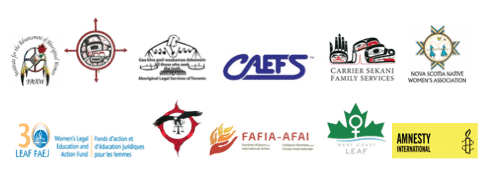April 25, 2016
The Legal Strategy Coalition on Violence Against Indigenous Women (LSC), a national coalition of individuals and civil society organizations, has supported the call for a national inquiry into the issue of missing and murdered Indigenous women and girls (MMIW). Like other advocates, activists and community members, the LSC is deeply concerned that the inquiry be a meaningful one.
LSC members have a breadth of knowledge and interdisciplinary expertise regarding the MMIW issue. Today, the LSC has released a statement on the importance of full provincial and territorial cooperation with the upcoming national inquiry.
It is crucial that the role of provinces and territories and the extent of their participation in the upcoming national inquiry be clearly determined as soon as possible. The full participation and cooperation of all Canadian jurisdictions in the upcoming national inquiry is necessary in order to ensure meaningful outcomes.
The provinces and territories have publicly expressed support for a national inquiry on MMIWG, and while these statements of support and commitment are important, the legal mechanisms for ensuring this cooperation and collaboration remain unclear. The LSC urges federal, provincial, and territorial governments to take the required legal steps to ensure that cooperation and collaboration are fully authorized through a provincial or territorial delegation of power.
The LSC statement provides details as to why this interjurisdictional cooperation is so important. For example:
- Building on its previous in-depth research reports, the LSC statement notes that it is clear that the majority of existing reports on MMIWG advocate for greater inter-jurisdictional cooperation on violence against Indigenous women and girls in Canada, as well as considerable involvement and leadership on this issue from the provinces and territories.
- In the context of violence against Indigenous women, there are important overlaps in the constitutionally mandated divisions of power between governments in Canada, such as those governing child welfare, policing, housing, social assistance, justice and prisons. These areas are significant because many root causes for this violence involve the social and economic marginalization of women that makes them more susceptible to, and less able to leave, violent circumstances.
- Data collection is another example of the need for interjurisdictional cooperation and open information-sharing before, during, and after a national inquiry. It will be crucial for institutions, including police, at all levels of government to share their data on violence against Indigenous women in order for the inquiry to develop a clearer understanding of this issue – including the exact number of murders and disappearances, which is still unknown.
- Provincial and territorial support for the inquiry must be unequivocal, clear, and legally enforceable. This could take the form of a binding Memorandum of Understanding (MOU) between the federal, provincial and territorial governments that sets out how they will cooperate in order to ensure their full and meaningful involvement in the inquiry. Provinces and territories also have certain legislative options for legally and explicitly requiring full provincial and territorial involvement and inter-jurisdictional cooperation in the upcoming inquiry, such as joint resolutions or orders in council from Parliament, the provincial legislatures, and territorial assemblies.
The LSC urges the provinces and territories, along with the federal government, to take action now to ensure the success of this critical national inquiry. The full LSC statement is available here.
This news release was endorsed by the following individual and organizational members of the Legal Strategy Coalition:
Aboriginal Commission on Human Rights & Justice
Aboriginal Legal Services (ALS)
Amnesty International Canada
B.C. Civil Liberties Association (BCCLA)
Canadian Association of Elizabeth Fry Societies (CAEFS)
Canadian Feminist Alliance for International Action (FAFIA)
Carrier Sekani Family Services
Professor Aimee Craft, Professor, Faculty of Law, University of Manitoba
Law Office of Mary Eberts
Professor Brenda Gunn, Faculty of Law, University of Manitoba
Indigenous Blacks & Mi’kmaq Initiative Schulich School of Law, Dalhousie University
Institute for the Advancement of Aboriginal Women (IAAW)
Constance MacIntosh, Associate Professor of Law; Director, Health Law Institute, Schulich School of Law, Dalhousie University
Native Women’s Association of Canada (NWAC)
Nova Scotia Native Women’s Association (NSNWA)
Kim Pate, Executive Director, Canadian Association of Elizabeth Fry Societies
Pivot Legal Society, Vancouver
Union of British Columbia Indian Chiefs (UBCIC)
Women’s Legal Education and Action Fund (LEAF)
West Coast LEAF
For more information, please contact:
Cheryl Maloney, President, Nova Scotia Native Women’s Association, 902-751-0077
Constance MacIntosh, Associate Professor, Schulich School of Law, Dalhousie University,
(902) 494-3554
Mary Teegee, Executive Director, Child and Family Carrier Sekani Family Services, Chair, Highway of Tears Initiative, (250)562-3591 ext. 205
Kim Stanton, Legal Director, Women’s Legal Education and Action Fund (LEAF),
416-595-7170 ext. 223


